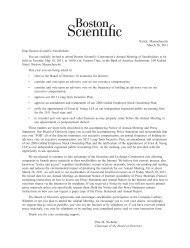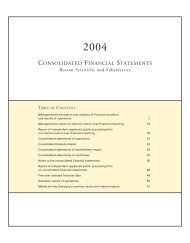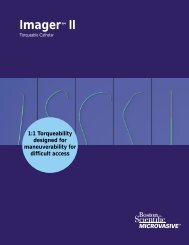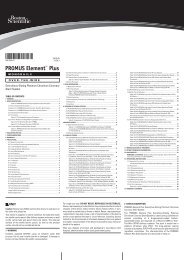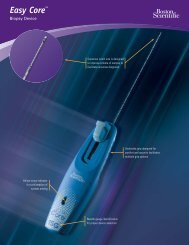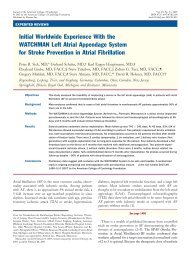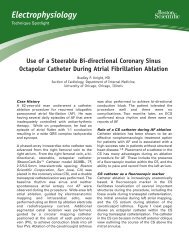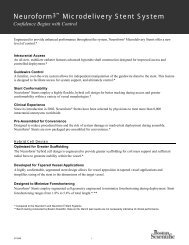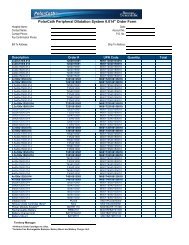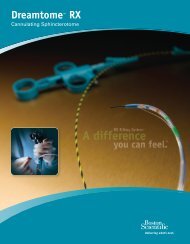Physician Reimbursement Primer for Cardiac ... - Boston Scientific
Physician Reimbursement Primer for Cardiac ... - Boston Scientific
Physician Reimbursement Primer for Cardiac ... - Boston Scientific
You also want an ePaper? Increase the reach of your titles
YUMPU automatically turns print PDFs into web optimized ePapers that Google loves.
Chapter 2<br />
MS-DRG Logic <strong>for</strong> CRM Procedures<br />
The following discussion describes the MS-DRG logic <strong>for</strong> CRM procedures. The inpatient<br />
payment system, as explained above, is driven by ICD-9-CM codes and assigned to an<br />
MS-DRG based on a hierarchy. Each MS-DRG represents a similar case complexity <strong>for</strong><br />
reimbursement purposes.<br />
Pacemakers or <strong>Cardiac</strong> Resynchronization Therapy<br />
Pacemakers<br />
The MS-DRG logic <strong>for</strong> single/dual and CRT pacemaker implants divides cases into three<br />
tiers:<br />
• The presence of an MCC diagnosis places the case in MS-DRG 242.<br />
• If a CC is present, MS-DRG 243 with CC is assigned.<br />
• If no CC or MCC is present, MS-DRG 244 is assigned.<br />
The following case scenario demonstrates the logic. A patient has a single-chamber<br />
pacer <strong>for</strong> bradycardia. The patient develops class III heart failure and conduction delay.<br />
The single-chamber pacemaker is upgraded to a CRT-P system. Under the MS-DRG<br />
Pacemaker<br />
or<br />
CRT-P<br />
System<br />
w/ MCC<br />
w/ CC<br />
w/o CC/MCC<br />
MS-DRG<br />
242<br />
MS-DRG<br />
243<br />
MS-DRG<br />
244<br />
$24,000<br />
$16,500<br />
$13,000<br />
Note: 2009 national average payments. Amounts have been rounded. Final rates may vary due to geographic differences.<br />
system, heart failure unspecified (428.0) is designated as a non-CC; there<strong>for</strong>e, MS-DRG<br />
244 is assigned. However, if the patient presented with chronic combined systolic and<br />
diastolic heart failure, code 428.42 and MS-DRG 243 would be assigned, as this code is<br />
a designated CC. If the patient had acute combined systolic and diastolic heart failure,<br />
code 428.41, then MS-DRG 242 would be assigned, as this code is an MCC.<br />
ICD or <strong>Cardiac</strong> Resynchronization Therapy Defibrillator<br />
The MS-DRG logic <strong>for</strong> ICD and CRT-D system implants includes consideration of<br />
whether an MCC diagnosis is present.<br />
• If no cardiac catheterization is per<strong>for</strong>med, the presence of an MCC splits the DRGs<br />
into MS-DRG 226 or 227.<br />
• If a cardiac catheterization is per<strong>for</strong>med, the presence of a diagnosis of heart failure,<br />
acute myocardial infarction, or shock with an MCC diagnosis splits the DRGs into<br />
MS-DRG 222 or 223. Without a diagnosis of heart failure, acute myocardial infarction,<br />
or shock, the MCC diagnosis also splits the DRGs into MS-DRG 224 or 225.<br />
As mentioned previously, acute heart failure is an MCC, chronic heart failure is a CC, and<br />
428.9 or 428.0 as stand-alone codes are classified as a non-CC. The codes <strong>for</strong> acute<br />
myocardial infarction (initial episode) and cardiogenic shock are designated as MCCs.<br />
8 <strong>Physician</strong> <strong>Reimbursement</strong> <strong>Primer</strong> <strong>for</strong> <strong>Cardiac</strong> Rhythm Management



